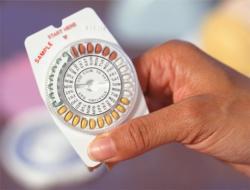At a time when 8-plus percent of Americans are currently unemployed, it seems a little odd that the election season has reopened debate over a form of medical care that 99 percent of women use. Controversy over contraception use came to a head last January, when the Department of Health and Human Services announced new guidelines requiring insurance companies to cover birth control, co-pay free, as a part of standard preventative care for women. (The rule went into effect last month.)
From there, even the mention of the term “birth control” could elicit boos at a Republican debate. Conservative candidates agreed that the rule was an encroachment on religious freedom. Rick Santorum supporter Foster Friess suggested that women opt for an over-the-counter solution instead, and stick an aspirin between their knees to help keep their legs closed. Not that the issue is important to him: “Here we have millions of our fellow Americans unemployed,” Friess told MSNBC’s Andrea Mitchell. “And people seem to be so preoccupied with sex. I think it says something about our culture.”
Now, a new study from the Guttmacher Institute has dug a little deeper into why many American women might be “preoccupied” with their sexual health. Researchers asked over 2,000 women, all visitors to publicly-funded family planning clinics, to justify why they use birth control (beyond the obvious). They reported, on average, six “very important” reasons for avoiding pregnancy, many of which align with traditionally conservative beliefs.
Forty-nine percent of women said they took birth control because they didn’t have a stable partner. Many didn’t want to be single moms, but they did want to have children eventually—60 percent said they were just waiting for their lives to stabilize first. Others already had families, and 23 percent said having a baby would make it difficult to care for the children they already have. And 41 percent of women reported using birth control for reasons unrelated to sex, like regulating periods or dealing with skin problems.
The survey results also underscore the reality that economic and social issues are not actually so distinct. Sixty-nine percent of women surveyed cited “financial constraints” as a “very important” reason for using birth control. Sixty-five percent of women said that they “could not afford to take care of a baby right now”; nearly a quarter of them said specifically that they used birth control because they or a partner were unemployed. Forty-nine percent said having a baby would make it difficult to keep their jobs or to get new ones. Forty-three percent said a baby would make it hard to stay in school. (No wonder births have been on the decline since 2007.) And, as the researchers note, every dollar spent toward pregnancy prevention saves the public $4 in health care for woman and child.
Nearly all women use birth control, nearly all men benefit from it, and making it accessible to the women who need it actually puts us all at an advantage. But it is young, poor women who benefit most. Sixty percent of women who use publicly-funded family planning services said that taking birth control helped them have “better control over my life.” With all the Republican talk about self-determination, shouldn’t poor women taking control of their lives please the conservative base?
